Coffee is a ritual that many of us take part in daily. There is just something about the act of drinking a warm cup in the morning to start your day. That being said, what many don’t realize is that the quality of their coffee could be impacting their health. Coffee is one of the most highly sprayed crops with toxic pesticides. That is why it can be so important to source the best organic coffee brand for your health.
* This post may include affiliate links. This means that products purchased from certain links will generate a small commission (At no extra cost to you). As always, I will only recommend brands that have passed my seal of approval and that I truly love. Thank you for supporting this little holistic space on the internet. *
When making healthy swaps in your life, it can be so impactful to first focus on the things you use most. Coffee has some of the highest contamination and toxicity levels of the items we consume. Many also consume this daily, if not countless times a day. So it can be important to make these types of swaps a priority. You will gain better health by ensuring your most consumed products are their healthiest. The quality of coffee can also have an impact on the side effects you experience. Poor quality coffee beans can cause higher rates of jitters, anxiety, headaches, and more than their organic counterparts. It doesn’t necessarily all fall on the pesticide intake, although reducing this is a smart move.
Health Hazards of Consuming Pesticide in Conventional Coffee Beans
There is no doubt that we have come a long way in terms of knowledge as it pertains to organic vs conventional farming. While some are still unaware of the impacts that pesticides have on our health, the general consensus is that we know they are not good for our overall health. Since the implementation of harmful pesticides such as round up, there have been major declines in human health and an uptick of chronic disease. This is not the only factor that has resulted in poorer health outcomes, but it certainly is one of the most impactful. Food is our fuel, we need to consume it daily. If our food is not good quality, then our health will follow suit.
Pesticides can have major negative consequences to human health. These impacts can be either acute or chronic depending on what pesticide someone is exposed to. Some of the negative health impacts of pesticide exposure and consumption are:
- Impacts of the entire nervous system
- Affect hormones and the endocrine system
- Irritation to skin or eyes
- Irritation to the lining of the gut
- Carcinogenicity (Cancer)
- Toxicity to unborn fetus
- Infertility
- Malignancies or tumor growths
- Damage to genetic material or DNA
- Development of blood disorders
- Development of nerve disorders
This list is not comprehensive and couldn’t possibly cover the vast number of health issues we have developed since we began using pesticides in farming practices many decades ago. There is just simply no doubting the negative health outcomes these chemicals have on us or our environment. Cancer has skyrocketed since the development of modern day pesticides and there are class action lawsuits being filed and won against substances like round up for it’s impact on the development of cancers and other health conditions.
“Pesticide residues on food lead to between 4,000 and 20,000 new cases of cancer every year.” -worldatlas.com
Impacts of Conventional Coffee Farming
As I mentioned above, conventional coffee beans are one of the highest sprayed crops in farming. Pesticides used in conventional coffee growing then transfers into that cup of coffee you drink daily. So for this reason alone, it is best to drink organic coffee. But, let’s dig a little deeper into how imperative the choice of switching over to organic coffee can be. There are three considerations when it comes to pesticide use:
- Danger to the consumer (ingestion of pesticides)
- Danger to the workers producing coffee beans in developing countries (unsafe spraying practices and lack of safety equipment)
- Danger to the environment (poor regulations on the type and amount of pesticides used in coffee bean production)
The hazards of growing coffee beans conventionally are plenty and it begins with the hazards effecting the farmers and workers on these farms themselves. Much of the coffee beans grown in the world are farmed in developing countries. Workers on these farms were found to be exposed to highly toxic solvents and pesticides daily. Safety measures in these countries are bare minimum and workers often spray crops with limited or no safety protection for themselves. Not only that, it was found that many workers were hand mixing these substances and disposing of them after spraying with no safety protocols in place at all. If we continue to purchase conventionally grown coffee, the demand for it remains the same and the farming practices will not change. If there is a growing demand for organic coffee beans, then more farms will have to adopt certain safety measures via organic certifications. This will impact the farmers and workers at a personal health level that otherwise would remain the same.
“Occupational health standards are poor or poorly controlled in developing countries. Concerning pesticide use, unsafe application techniques, low levels of education and poor or adverse health conditions among workers, and use of pesticides with higher toxic potential are found [57,58]”
(Hutter, H. P., et. Al 2018)
The fact is, many of us sipping on our coffees daily in the western world have no idea of the processes used to grow these beans we love so dearly. We certainly aren’t made aware by the larger conventional coffee companies who sell the final product on the grocery shelves otherwise they would lose major profits. Sometimes a window into the manufacturing process of a product can give us the biggest lens and advantage when it comes to making healthier choices for ourselves. In turn, we often shift where we spend our hard earned dollars. Until this happens, no change will occur. That is why it can be so important to really understand what we consume. Not only do you benefit from making a change that will directly impact your health, but you shift the market for the producers (farmers and workers) who are then incentivized to adapt to safer growing parameters which also in turn benefits their health.
“Many imported food products consumed in high-income countries are produced in countries in the Global South. Occupational exposure to pesticides in such countries has received almost no attention, while quite high concern is associated with the consumption of potentially contaminated products in high-income countries. There is little awareness in Western high-income countries about the conditions in which the imported food items from the Global South are produced.”
(Hutter, H. P., et. Al 2018)

Mold Contamination in Coffee Beans
Another major consideration when choosing an organic coffee brand is whether it tests for mold or mycotoxins. A good brand will offer results of third party contamination testing on their website or will readily disclose the reports when asked. Coffee beans are infamous for being one of the crops with the highest rates of mold growth. This mostly boils down to improper storage and handling of coffee beans. They are prone to mold growth and therefor require certain steps and care when it comes to storage and production. Without these standards, coffee beans can grow mold and produce mycotoxins at a rapid rate.
Interestingly enough, the presence of mold in coffee beans is more than just the ick factor. It can have long term detrimental health effects. Many people attribute side effects from coffee like jitters, rapid heart beat, anxiety and bitter taste to caffeine. But the truth is, this is actually due to the presence of ochratoxins (aka. a form of mycotoxin from mold) that is present in the beans from conventional farming and poor production and storage practices.
When coffee beans are processed, there is a possibility of mycotoxin formation. Mycotoxins are poisonous substances produced by mold or fungi. They are what effect us and our health as it pertains to mold exposure. The most common culprit when it comes to the coffee bean is an ochratoxin. There are many conditions that can lead to the development of ochratoxins, but conventional farming is one major factor. Conventional farmers use chemical fungicides during the growth process that can boost the presence of ochratoxins in the beans during processing.
If you want to ensure that your coffee does not expose you to mold, then a quick glance for whether the company produces third party contamination testing is all you need. There are many organic coffee companies who do this as mold contamination is becoming a popular topic in the world of coffee.
The Best Organic Coffee: Biodynamic Coffee Review
There are so many organic coffee companies popping up and that is such great news for us as consumers. We have options and I have tried many of them out there. Nothing has come close to beating one of my very favorite coffee brands: Biodynamic Coffee by Holistic Roasters. They go beyond what is necessary for the organic certification and farm their coffee beans using biodynamic practices.
Biodynamic vs Organic farming: What is Biodynamic Farming?
What is biodynamic farming? Essentially, biodynamic farming is organic farming but BETTER. It is regenerative organic farming. Biodynamic farming is a holistic, ecological and ethical approach to farming, gardening, food and nutrition. Biodynamic farming was initially developed in 1924 by Rudolf Steiner, a philosopher and scientist. It marked the first modern organic farming movement. It really is an adoption of the original ways of farming where the environment and the ecosystems were considered a part of the process.
Biodynamic farming treats the farm as a self sustaining system, considering fields, woods, wetlands, plants, animals, and people as interconnected components. This holistic approach integrates nature in its original form. This not only produces some of the most nutrient dense and healthiest crops known to man but it also ensures that the environment is not impacted at all. There is a large emphasis on composting and nourishing overall soil quality. This is so important because our soils health has depleted over the years due to poor crop rotation, lack of eco system and use of pesticides. Organic farming doesn’t use pesticides of course but the focus on soil health isn’t quite as strong as it is in biodynamic farming. Essentially, biodynamic farming takes organic farming one step further. It produces the healthiest possible yields and really brings us back to the quality of foods our ancestors enjoyed and thrived on.
Holistic Roasters are the creators of Biodynamic Coffee and they produce their beans at family run farms that adopt biodynamic practices to ensure the healthiest possible coffee beans available. I have yet to find a coffee brand that offers this level of quality. Nothing has compared to Holistic Roasters in my experience.
Clean coffee sourced exclusively from family-run farms and cooperatives. All our coffee is grown using regenerative organic farming practices that improve the natural environment, certified Biodynamic & Organic, and lab tested for contaminants like mold & heavy metals. All packaging is 100% compostable. – Biodynamic Coffee by Holistic Roasters
Holistic Roasters focus on growing and sourcing some of the highest quality coffee beans in the world. They cultivate close relationships with the family farmers they source from and produce some of the healthiest coffee available. Holistic Roasters and the farmers they source from are passionate about growing processes and the health and diversity of nature. “Biodynamic coffee farming offers increased yields, resilience to pests and diseases, and better health & vitality for farming communities as well as for the people who eat the food (and drink the coffee) that is grown. We want every farm to be a happy & healthy farm!” – Biodynamic Coffee by Holistic Roasters
Certifications held by Biodynamic Coffee
Biodynamic Coffee holds three very important certifications so you can rest assured that their dedications are continuously met:
- Firstly, they are Demeter Certified. This ensures products are grown using biodynamic processes which are a step beyond organic farming. Demeter is the owner of the trademark terms “Biodynamic®” and “Demeter®”. Demeter is the only certifier for Biodynamic farms in America. When you see a demeter certification, you will know that all organic benchmarks are met. However, Demeter standard is much more extensive than just the standard organic cert., with stricter requirements around imported fertility, greater emphasis on on-farm solutions for disease, pest, and weed control, and in depth specifications around water conservation and biodiversity.
- Second, they are USDA Organic Certified. This ensures that all farming practices follow strict organic guidelines during farming practices. No pesticides or synthetic fertilizers are used in the farming process of their product.
- And lastly, they are Ecocert Certified. Ecocert focuses on standard surrounding the farming practices and it’s impacts on the environment. It is an internationally recognized standard for environmentally responsible agriculture.
Third Party Laboratory Testing
Biodynamic Coffee by Holistic Roasters also offer full transparency when it comes to third party contamination testing. They display all the findings for consumers to see clearly on their website. Third party testing tests for the following:
- Yeast and Mold levels
- Aflatoxins
- presence of Ochratoxin
- Heavy metal contamination (lead, arsenic, cadmium, and mercury)
- Presence of bacteria (Coliform, Salmonella, E coli)
All of their tests show exceptional results well within healthy range and many findings of negative presence.

Biodynamic Coffee Review + Shop
I have personally been drinking this coffee alongside my Husband and we both love it. The taste is unmatched and all three blends offer a variety of strength and taste. Finding a coffee that exceeds all health standards and tastes incredible is like hitting the jackpot. Holistic Roasters certainly focuses on quality when it comes to their coffee beans. They carry a light, medium and dark roast which offer different taste profiles based on your preferences.
They also offer multiple roasting options after you’ve chosen your desired roast. You can purchase whole bean as well as preparations ideal for french press, pour over, coffee maker, moka pot, medium espresso, fine espresso and very fine espresso. I personally opt for whole bean. Rubicon is their lightest roast and a great option for pour over method. Rise & Shine is their medium roast which is rich, balanced and bold. The medium roast is best for espresso and french press. It’s also a great source of caffeic acid and antioxidants. These are compounds that reduce inflammation and help prevent premature aging. French Roast is their dark roast. It pulls smoky. bitter, and chocolate and is low in acidity.
The coffee comes in standard sized bags as well as bulk 5lb bags for those of us who go through it fairly quickly.
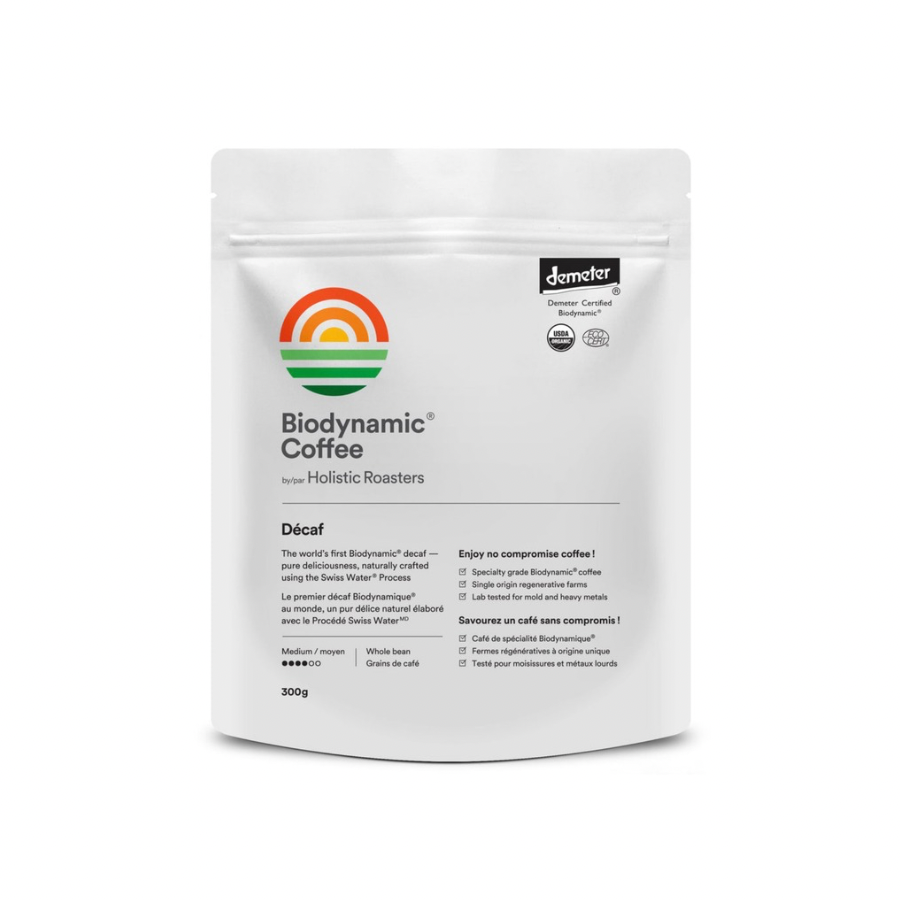
Biodynamic DECAF coffee – 300g.
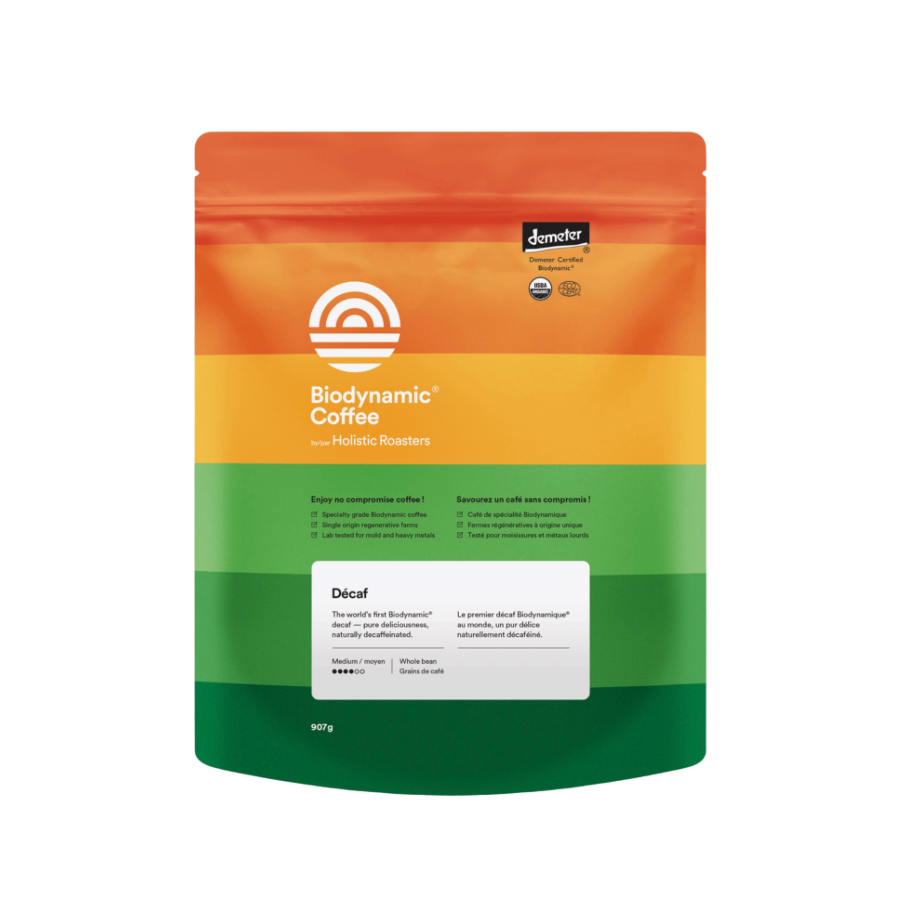
Biodynamic DECAF Coffee – 907g.
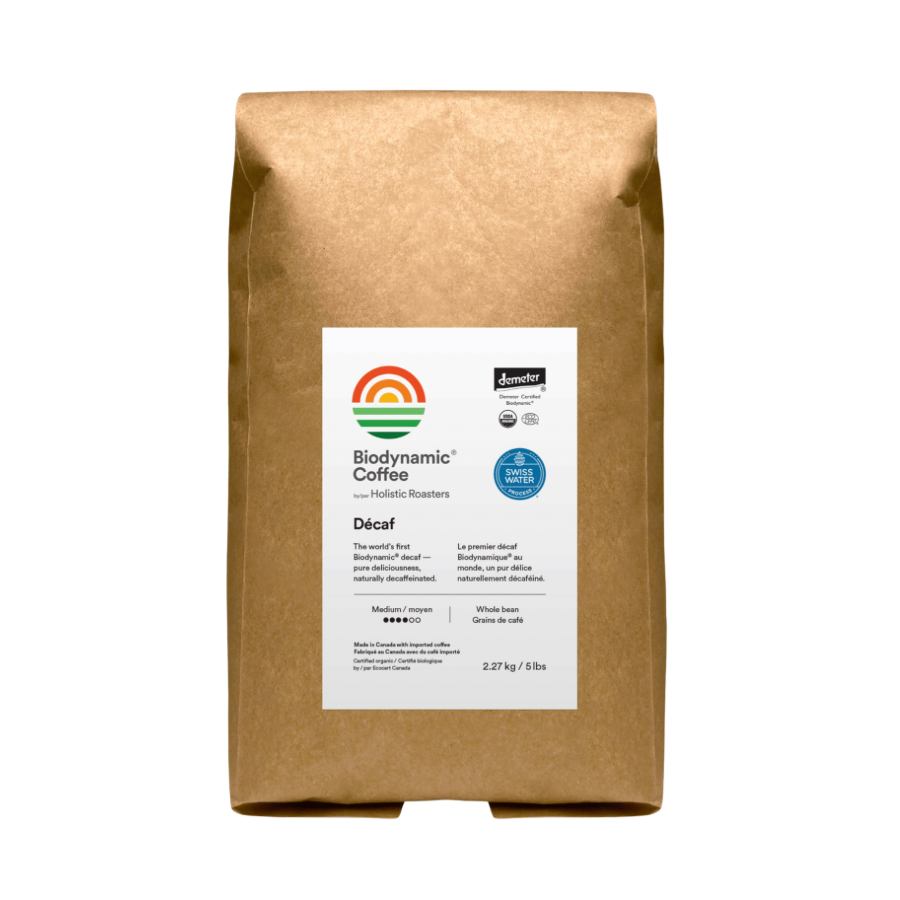
Biodynamic DECAF Coffee – 5lb.
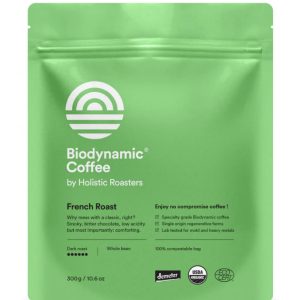
French Roast – Dark
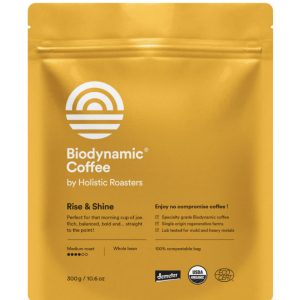
Rise & Shine – Medium
Rubicon – Light
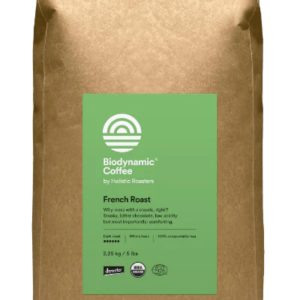
French Roast – Dark 5lb
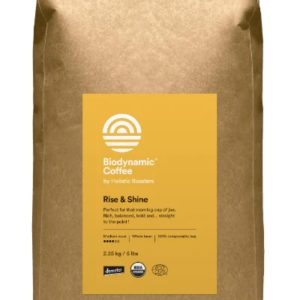
Rise & Shine – Medium 5lb
Rubicon – Light 5lb
Holistic Roasters was kind enough to extend a 15% discount to The Holistic Vanity readers. Use code: THEHOLISTICVANITY at checkout and you’ll gain some extra savings on your coffee beans 🙂
Happy Healthy Brewing!
** PIN the image below to save this post for later **
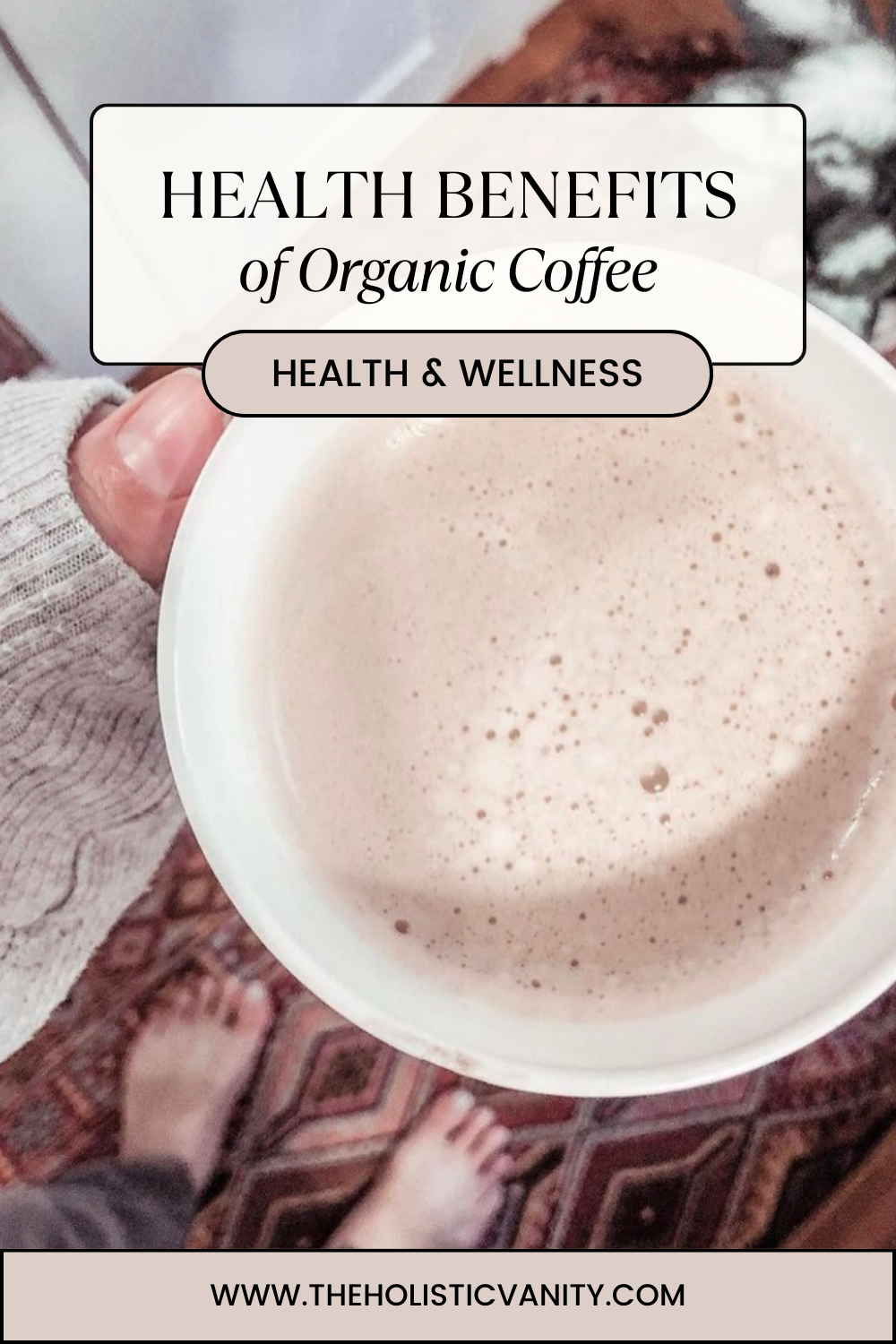

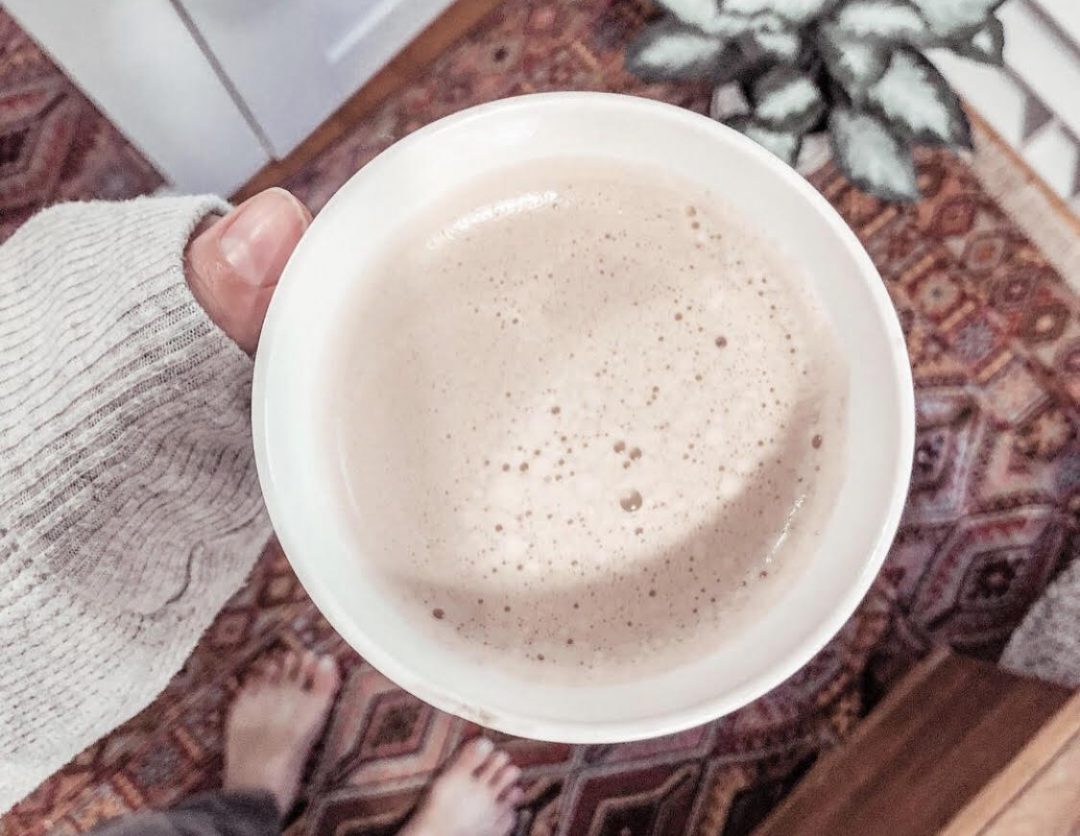
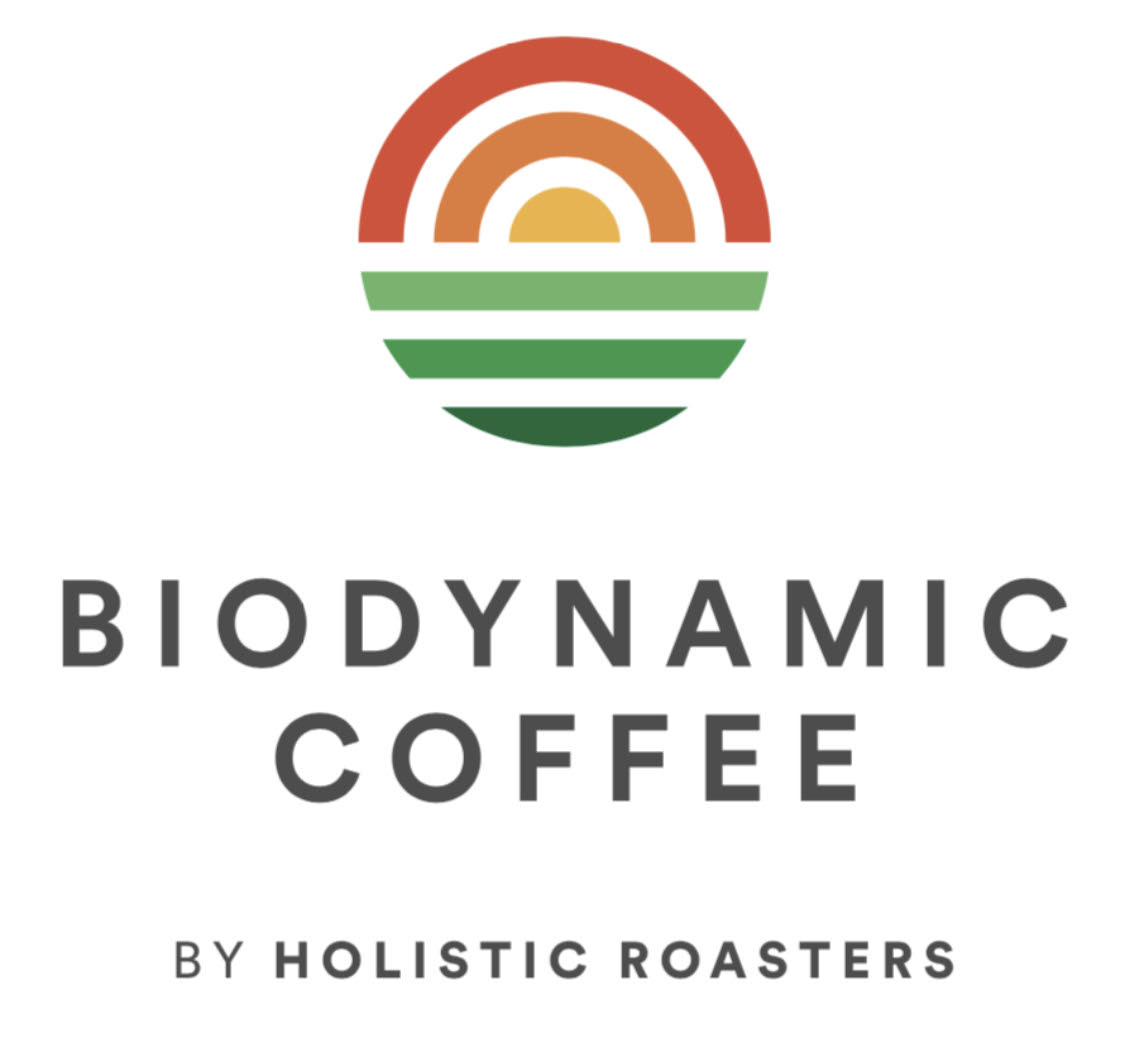
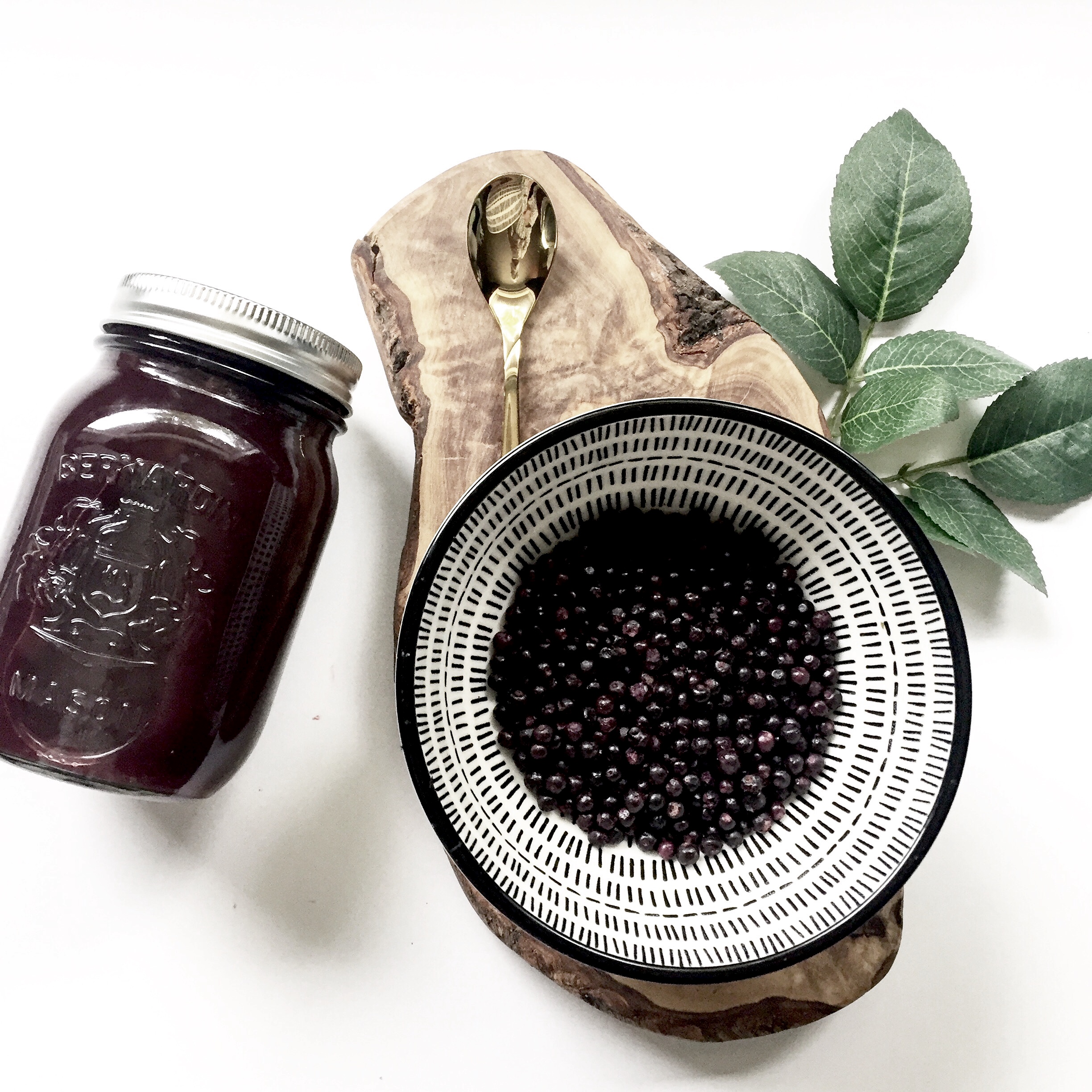
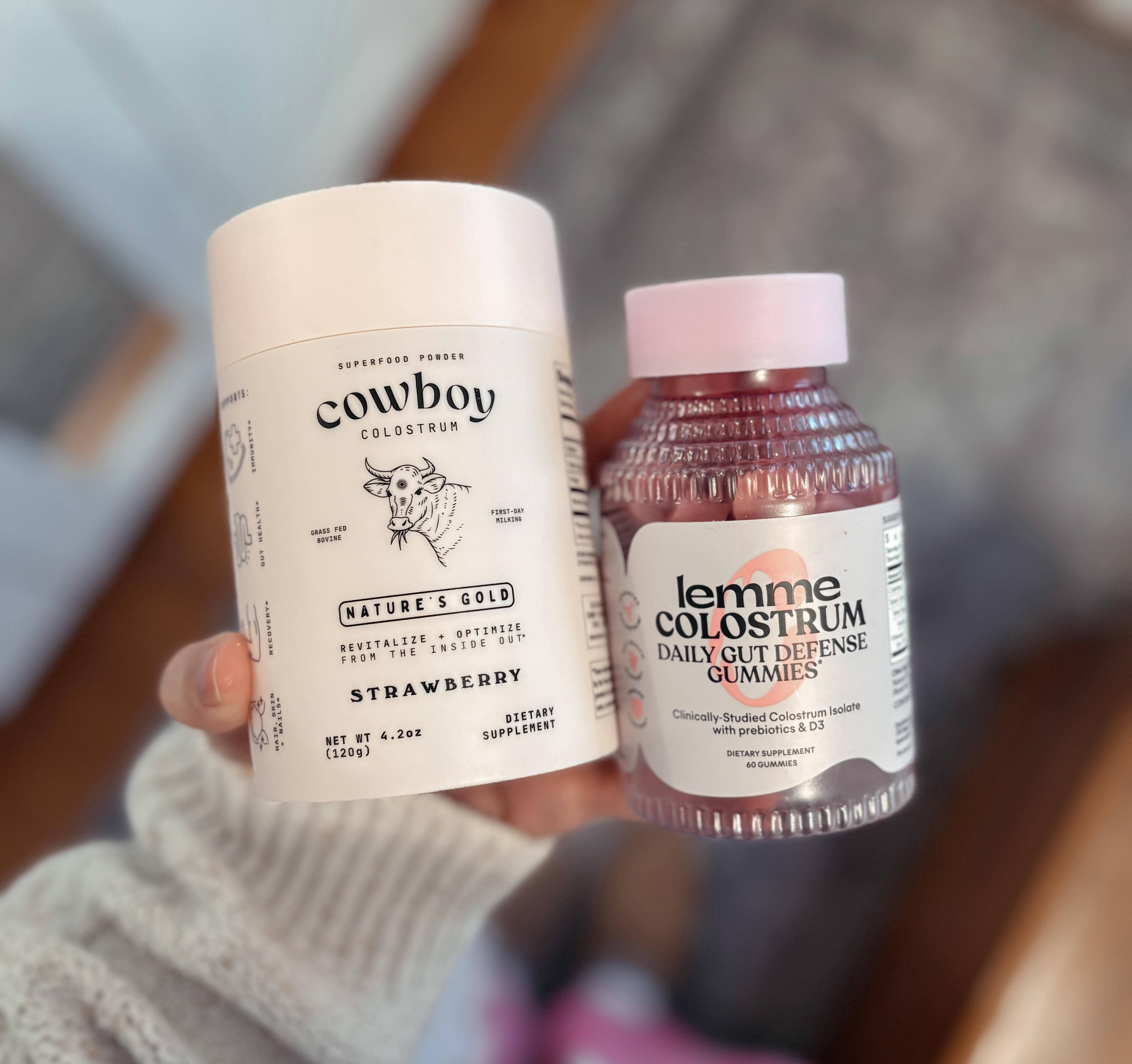

1 Comment
[…] The Best Organic Coffee Brand: Biodynamic Coffee […]